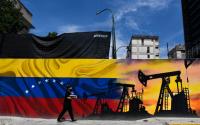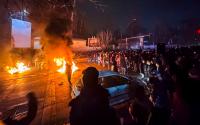By Daniel Howden
Published: 16 October 2006
A populist banana tycoon and a left-wing ally of Venezuelan president Hugo Chavez were last night heading for a run-off vote after neither won a clear victory in Ecuador's presidential poll. Rafael Correa a former finance minister who resigned from the government after speaking out against a US-backed trade agreement, had seen support surge through the campaign as he addressed mass rallies wielding a leather belt and promising to "give the lash" to Ecuador's elite.
After years of government collapses Mr Correa had vowed to rewrite the constitution, curb political parties, suspend the free trade deal with Washington and refuse to renew an accord on a US military base used to fight drugs.
But Mr Correa's opponent, the billionaire banana tycoon Alvaro Noboa, gained ground in yesterday's voting, with exit polls last night suggesting that neither side had won a clear victory. A Cedatos Gallup poll showed Mr Noboa with 27.2 per cent of the votes and Mr Correa with 25.4 per cent after first round voting, while another poll showed Mr Noboa with 28.5 per cent of the votes and Mr Correa with 26.5 per cent.
If the polls prove accurate and no candidate has won more than 50 per cent, the presidency will be decided in a run-off next month. Latin America's pink tide had been stemmed in recent months with a narrow defeat for Manuel Lopez Obrador in Mexico and centrist Allan Garcia's win over Ollanta Humala in Peru.
Ecuador's election has been electrified by the looming figure of Mr Chavez, Venezuela's theatrical left-wing President. His barnstorming speech at the United Nations in New York in which he compared President George Bush to Satan and complained of the smell of sulphur on the platform was rapturously received by a growing anti-American movement worldwide.
Mr Correa was quick to see the appeal of anti-Bush rhetoric with voters in Ecuador and noisily trumpeted his support for Mr Chavez's stand at the UN General Assembly. "Calling Bush the Devil is offending the Devil ... The Devil is evil but the Devil is intelligent," Mr Correa said.
These kinds of comments have struck a chord with an otherwise disillusioned electorate, seemingly enabling him to attract an estimated one-third of voters.
After three presidents were ousted in the last decade, many Ecuadoreans are looking for change. More than half of the 13 million population live in poverty, many of them indigenous communities that still speak Quechua language before Spanish.
An economic crisis in 1999 forced Ecuador to default on its foreign debt and assume the dollar as its currency. Last year civil unrest forced out President Lucio Gutierrez amid claims he had abused his authority.
Although he has a middle-class background, Mr Correa is fluent in Quechua. He also has been involved in educational programmes in poor Amerindian areas, which are expected to give him a strong advantage in a country where 45 per cent of the population claim indigenous heritage. A second vote will likely be close. Mr Noboa may draw on support from traditional parties such as the Social Christians, who see Mr Correa as a threat to their influence, but Mr Correa can appeal to voters from all social classes.
"Both are anti-political candidates taking advantage of the discredited political establishment in Ecuador even if they are on different ends of the political spectrum," said Michael Shifter at the Inter-American Dialogue think-tank.
"Whoever wins in the second round this is not exactly a recipe for stability."






